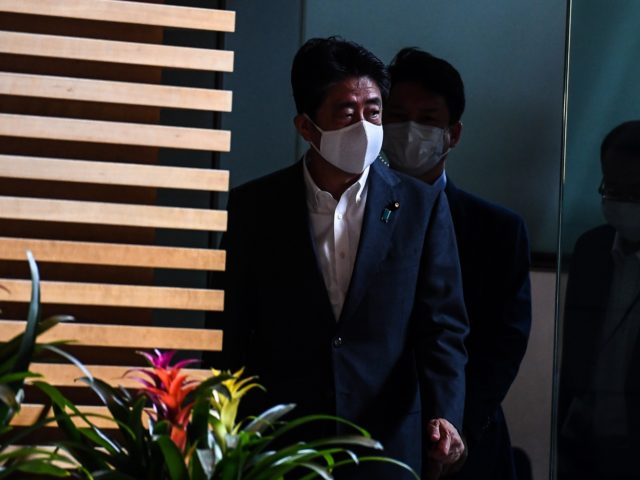Japan’s conservative Liberal Democratic Party (LDP) will reportedly meet to choose a new leader – and most likely the new prime minister of the country – between September 13 to 15, Japanese media outlets reported on Monday.
The left-leaning Japanese newspaper Asahi Shimbun revealed that the LDP has scheduled a vote in the nation’s legislature, the Diet, for prime minister on September 17. The prime minister is typically the leader of the majority party of the Diet, which in this case remains the LDP.
Abe’s immediate successor will lead for one year through September 2021, until a more formalized election procedure can take place within the LDP.
Japanese media have floated multiple senior party members as candidates to the prime ministership, including Suga Yoshihide, the LDP chief cabinet secretary; head policy researcher Kishida Fumio, and former Secretary-General Ishiba Shigeru. All three have made public statements that indicate they will actively campaign for the post once the LDP reveals the protocol to move forward.
Current Prime Minister Abe Shinzo announced his intention to resign on Friday following a prolonged battle with ulcerative colitis that, he lamented in his remarks, made it impossible for him to grant governing Japan his full attention. He will leave the office of the prime minister the longest-serving in that role in the history of the country, best known for his “Abenomics” economic policy and campaign to built up Japan’s self-defense forces and expand its ability to confront neighborhood threats like China and North Korea.
The Japanese broadcaster NHK reported on Monday that the General Council of the LDP will meet Tuesday to choose exactly how they will vote for an interim prime minister and leader of the party. Current LDP Secretary-General Nikai Toshihiro will reportedly organize proceedings. The most urgent debate, NHK suggested, was how to vote for the next year: either allow all official LDP members to vote, or only the senior leadership. The latter is typically a protocol for urgent situations when left with no leadership, as opposed to the regularly scheduled elections that are more inclusive.
Asahi claimed on Monday that the LDP had likely already chosen “a simplified format that will exclude rank-and-file members and friends of the party from voting.”
At least one of the likely frontrunners in the race for leading the conservative party, Kishida, has expressed clearly his desire to run for the top spot.
“My commitment to continue working to become the next leader remains unchanged,” NHK quoted Kishida as saying on Saturday. Kishida had already said in a speech prior to Abe’s resignation last week that he was interested in running for the leadership of the LDP.
The Agence France-Presse (AFP) described Kishida as “mild-mannered” and noted that his experience as a former foreign minister likely gives him a higher profile with other world leaders should he assume the post.
Suga, the chief cabinet secretary, has not personally stated he will run for the post, but those close to him are heavily signaling that he will do so. The Japanese news agency Kyodo reported, citing a source close to the LDP, that Suga may deliver a speech on Tuesday formally announcing his intention to run for the leadership post and the likely prime ministership. Suga also reportedly told Nikai, the party’s secretary-general, privately that he intends to run. Some reports also claimed Nikai encouraged him to run, making him the LDP establishment’s preferred choice. At 71, Suga also represents the elder wing of the Party. Kyodo News claims Suga is waiting for a formal announcement on election procedure before declaring.
The third top-tier candidate, former LDP leader and former defense minister Ishiba Shigeru, has made more public indications that Suga that he intends to run but has not overtly said so like Kishida. Ishiba made a name for himself as a public critic of Abe’s from within his own party, which has resulted in high public support generally – polls surveying the general public also include people who typically do not vote for the LDP – but a struggle to cement support within the LDP. As the emergency election will grant votes only to senior LDP leaders, Ishiba faces an uphill battle. The former defense minister failed to win an election for the presidency of the LDP in 2018, receiving votes from fewer than 20 lawmakers.
Reports published before Abe’s resignation indicated that Ishiba had already begun the work of repairing ties with the LDP’s Abe loyalists. Two weeks ago, Kyodo reported that Ishiba was struggling to convince the dominant faction of the LDP that supports Abe to see him as a potential successor. Ishiba last challenged Abe for the leadership of the party in 2012, when Abe returned to the prime ministership (Abe was first prime minister in 2006, but left due to his struggle with ulcerative colitis).
“In media public opinion polls, Ishiba is often chosen as the most suitable person to become the next prime minister, but Abe’s administration regards him as a political foe,” Kyodo noted.
Kyodo published a poll on Sunday finding widespread popular support for Ishiba. The poll – which surveyed eligible voters, not LDP members – found that Ishiba received support from 34 percent of respondents, compared to the second most popular choice, Suga at 14.3 percent. The third choice appeared to be the current defense minister, Kono Taro, whose name has surfaced as a long-shot candidate for prime minister. While the survey did not ask questions only of LDP voters, it found the majority party still widely popular. Almost half of respondents (48 percent) said they intended to vote for the LDP in the next parliamentary elections; the most popular minority party received support from only 11.6 percent of those asked.
Ishiba has publicly criticized the plan for an emergency election that grants only senior LDP members a vote for the leadership of the party.
Follow Frances Martel on Facebook and Twitter.

COMMENTS
Please let us know if you're having issues with commenting.